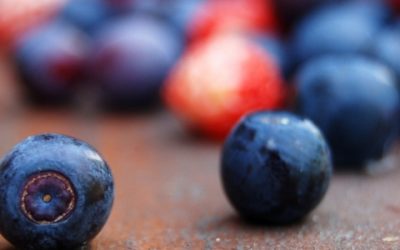WORDS: Caroline Scott (Nutritionist at Gwinganna)
- Breathe deeply
Breathing is an involuntary response, yet deep breathing is a technique that many of us need to learn. When you’re stressed, you only take shallow breaths in the top of your chest. This causes a build-up of carbon dioxide in your lungs, eventually leading to a change in the pH of your lungs, causing acidity and cellular damage. Breathing deeply into your lungs, using your diaphragm muscle as a set of bellows, you encourage gaseous exchange at the base of your lung lobes. This allows for oxygenation of your blood, so the iron molecule can be escorted around your body to nourish cells. Yogic breathing teaches your body to relax, to breathe deeply and to ensure adequate oxygenation, thus nourishing cells and maintaining good energy levels.
- Eat food slowly and chew thoroughly
Digestion starts in the mouth. The more you liquidise food in your mouth, the better it will be absorbed in your stomach and intestine. To avoid poor digestion, it is important not to overload your mouth or stomach. In addition, the more thoroughly you chew food, the longer it takes you to eat, so you’re more likely to notice when you’re full and to eat less. Many people say they no longer hear the hormonal message the body sends to our brain telling us to stop eating. So often we bolt our food before the message reaches our brain, and we have overeaten again. Overeating can lead to poor digestion and obesity.
- Eat less than you think you need
When it comes to food, we seem to suffer from a fear of scarcity and panic if we don’t get enough. In general, people tend to over-eat, not under-eat. This often occurs if we eat too quickly, or eat without thinking about it. How many times have you sat in the front of the TV or at the movies and eaten a huge bowl of popcorn or choccies, only to realise it has all gone and we don’t even remember eating it? Over-eating is easy, but it can lead to poor digestion, poor absorption and chronic long-term health problems, including obesity and diabetes.
Your body is designed to eat small, frequent meals. As a guide to portion control, make both your hands into fists and put them together – that is roughly the size of your fully-extended stomach. Any more food than that in one sitting is over-eating, so is you limit each meal to that amount, you will not overtax your digestive system. Use a smaller plate if that helps. Don’t return for seconds. Always leave something on your plate. All these tips can help prevent over-eating. Most importantly, however, eat slowly.
- Eat mainly plant-based foods
Our bodies are made up of at least 70% water. We need to maintain and replenish these levels, so our food choices should include at least 70% water-based foods. These can be found in fresh plants. They will hydrate your body and also alkalise your system. Your blood and body pH is very important and your diet needs to allow for the delicate alkaline balance in your blood and body. If you eat too many acid-forming substances, your blood and body can become dangerously acidic. Your diet needs to be based on vegetables – enjoy fresh veggie juices, salads and sprouts each day to maintain adequate alkalinity, as well as vitality and vibrancy.
- Eat real food – avoid processed, refined food
A working definition of real food is: was it growing, running, flying or swimming before it was harvested for your consumption? Packaged and processed products do not fit this category. The further your food looks from its natural state, the less nutrients it contains and the more harmful chemicals it is likely to contain. Vegemite, although a popular choice for many Australians, does not bear any resemblance to any bush, plant or tree currently growing. Any nutrients it is claimed to possess could be gained from unprocessed, natural foods in their raw state. The same can be said of many so-called foods. A good rule of thumb is, if man made it, don’t eat it! Nature always manages to create perfect food containing all the nutrients we require to live healthy, vibrant lives. We just need to remember to eat them.
- Eat organic food to increase the amount of nutrients available to your body
The jury is finally in – organic foods are better for you. There is so much research out there now, it can leave you in no doubt that organics are better and contain 40-60% more nutrients than their non-organic counterparts. Plus they don’t contain the many chemicals, pesticides, herbicides and fungicides to which non-organic produce is exposed. The more organic, rather than non-organic, food you eat, the less total food you need to meet all your body’s nutrient requirements. In time, you will start to eat less and feel less bloated, making it easier to lose weight. You will also enjoy higher energy levels and experience the vitality and vibrancy that we are all supposed to feel!
- Eat to maintain moderate blood glucose levels, combining proteins, fats and carbohydrates
So often, people have a hard time managing their weight, energy levels and moods. People often over-consume foods containing processed carbohydrates, leading to a spike in blood glucose levels and a corresponding rise in circulating insulin levels. This can lead to weight gain, since insulin causes fat storage. By combining meals with good quality protein and some fat, the glucose response will be less and cells will be more responsive to circulating levels of insulin, leading to improved weight control, mood and energy management. Avoid low-fat products and low-joule drinks, which are often very high in carbohydrates, thus increasing blood glucose levels. It is better to enjoy the full-fat product and have less of it. Fat will not increase blood glucose levels.
- Eat enough good fats
Every cell in your body is lined with a fatty lining, which is essential to differentiate the cell and to maintain the integrity of the cell and its contents. You need good fats in your diet to help replace all those molecules of fat on a continual basis. Your brain cells are also made of fat, so they need an intake of fat to maintain repair and growth. Fat has been much maligned as a macronutrient, but it is clear we need fat in our diet. The type of fat our cells require is a mixture of omega 3, 6 and 9, the fats in natural foods. Some saturated fat is necessary to provide lauric essential fatty acid, found in coconut, butter and breast milk. This underrated fatty acid is essential for production of natural killer cells, our first line of defence against cancer.
The fats to avoid are those that cause harm to your body – any trans fatty acids such as those in margarines and softened butters, homogenised fats and oxidised fats found in products containing vegetable oil. Many fats are unstable under temperature and vegetable fats are especially at risk. It is safer to cook with a saturated fat or a fat that will not be affected by low temperatures, such grapeseed oil, rice bran oil and macadamia nut oil, but avoid heating other oils. Enjoy olive oil cold over salads and in dressings. Flaxseed oil is very important, containing high levels of omega 3s, which are anti-inflammatory in the body, but unstable at temperatures over 45 degrees.
- Enjoy plenty of fresh water daily
Your body is made up of at least 70% water and you must replenish it daily. Ensure a good supply of fresh water and limit substances that are dehydrating, such as high levels of acid-forming foods, caffeinated beverages such as colas, coffee, tea, energy drinks and sugary drinks.
- Eat plenty of antioxidant-rich foods
Free radicals cause the cellular damage that leads to long-term health problems. In today’s environment, it is impossible to completely avoid free radicals and their oxidising effects, but you can limit your exposure to these toxic molecules by reducing your consumption of them and by increasing the amount of antioxidants in your blood. Fresh fruit and vegetables contain the largest amount of antioxidants. You need to base your diet on these plant foods, which provide all the nutrients you need to build your own antioxidant defence system, which is more effective than any supplement you can buy. Sprouts are high in chemicals that create superoxide molecules that go out to bat for you when you’re under attack by infective agents or cellular breakdown. Remember to enjoy a variety of plants and be mindful not to over-eat fruit, as the fructose can negatively affect blood glucose levels. Focus on vegetables, with some fruit.
Here at Gwinganna, we prefer to follow a whole food, organic diet. Based on vegetables and green leaves fresh from the garden, the meals provided to all guests are abundant in vitamins, minerals and enzymes – in short, real living food. Using food as nature intended – without splitting it, rolling it, refining it or pasteurising it – we get the optimal level of nutrients possible from each mouthful. Every morsel is made from scratch, without the addition of preservatives, chemicals, additives, artificial sweeteners or colours. Containing at least 80% vegetables, greens, sprouts or foods that are based on water, the Gwinganna diet is very alkalising on the body and ideal for encouraging detoxification and elimination. Following an organic, plant-based diet enhances energy and vitality in the body and promotes good cellular health and integrity, which is the basis for positive long-term health outcomes. Limiting or eliminating acid-forming foods and beverages, especially caffeine and alcohol, enhances cellular health, leading to improved overall health outcomes. Consumption of two litres of fresh water daily helps eliminate toxins from the body and hydrates the tissues to bathe cells in vital, life-giving fluid.
At Gwinganna, we embrace party foods as part of celebrations – not our regular diet, but occasional foods to be enjoyed. By enjoying a combination of raw and cooked foods, smooth digestion is encouraged and supported. Natural digestives are used to optimise absorption from food and increase the nutrients available to the body’s cells. Fresh vegetable juices boost the alkalising potential of the diet and increase the antioxidants available to the liver and other body systems. Literally a rainbow of colour covers our tables in the form of fresh salads, rich in antioxidants and micronutrients. Cooking is kept to a minimum to retain as many nutrients as possible. Small amounts of butter, coconut and macadamia oil are used to cook with at low temperatures, encouraging retention of nutrients. Harmful, hydrogenised fats are avoided, limiting the amount of trans fatty acids and reducing the harmful oxidising effects that fats can have on cellular membranes. Foods are combined in such a way as to ensure moderate blood glucose levels, thus encouraging stable energy levels, moods and good weight management. Good quality proteins, fats and carbohydrates feature at every meal to support blood glucose control. Eating only what is necessary in terms of satiating hunger is encouraged, with three meals and two snacks spaced regularly through the day to ensure good energy levels.
In general, people tend to over-eat, not under-eat. This often occurs if we eat too quickly, or eat without thinking about it.


















